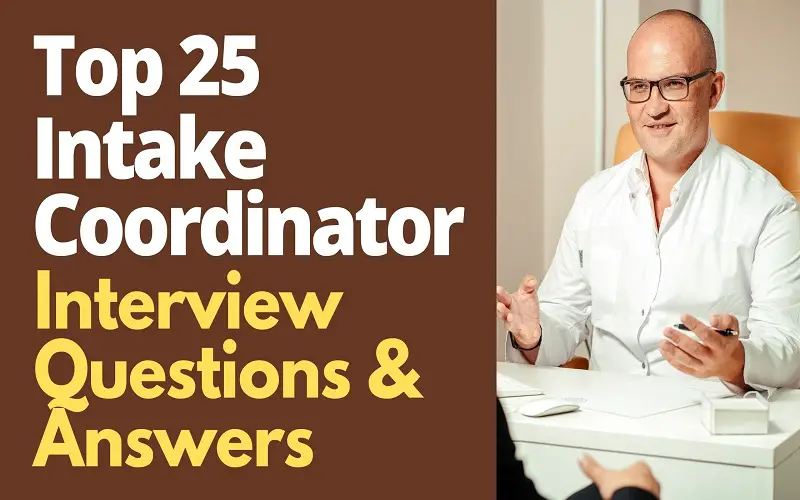Are you actively looking for an intake coordinator role? You are in the right place as this article looks at some of the questions you should expect in your interview. However, let’s first define what an intake coordinator does.
An intake coordinator is charged with managing patients’ registration as soon as they enter the healthcare facility. This entails gathering records, taking note of medical histories, and asking about any insurance information. Therefore, these professionals must have a set of qualities and qualifications needed for this job.
We will make your preparation easy by exposing you to the common questions early enough. Take a look at the following:
1. Why Are You Interested In This Role?
I have always wanted to work in hospital settings and help physicians save lives. As a person who grew up sickly, I understand the toll poor health takes on patients and therefore commit to making their lives easier and their hospital registration seamless. I also have all the requirements needed for this job, such as five years’ experience and excellent customer service, which will help me succeed.
2. What Are The Roles Of An Intake Coordinator?
An intake coordinator plays a number of essential roles in a healthcare facility. They welcome patients to the facility, manage the admissions paperwork and ensure the necessary information is digitally entered. Furthermore, they verify medical insurance coverage, answer phone, and email inquiries, attend to clinical work including filing, address different complaints and concerns from clients, schedule appointments, and comply with all the relevant policies and regulations. They also prepare and maintain patient charts. It is, therefore, a highly demanding and engaging job.
3. What Are The Qualities That An Intake Coordinator Needs To Be Successful?
An intake coordinator needs a load of qualities to succeed at their job. First, they should have excellent customer service skills as one of their roles is to welcome the patients and respond to their complaints or queries. Other necessary qualities include excellent communication and interpersonal skills, ability to work well under pressure, computer literacy, vast knowledge of office management and filing systems, and the right level of experience.
4. What Major Challenges Did You Face During Your Last Role? How Did You Manage Them?
My last workplace played a pivotal role in my career. It was my first interaction with a busy office, and therefore, I learned how to work well under pressure. However, the main problem that I faced was the outdated filing system, which was slow and, at times, unresponsive. I had to negotiate my way into a new filing system and a couple of other software, which considerably bettered my work.
5. Describe Your Daily Routine As An Intake Coordinator?
I have a pretty busy day as an intake coordinator. My day revolves around welcoming patients to the healthcare facility, admitting them and handling the paperwork, verifying their medical insurance coverage and health benefits, scheduling appointments for different sets and procedures, answering phones and emails, and addressing any complaints or concerns. I also attend to my clerical duties, including copying and preparing patient charts. I am always exhausted at the end of the day.
6. Describe Briefly About Your Experience
This is my fifth year in the healthcare industry. I have worked as a medical administrator for three years, making the work of physicians and colleagues easy and attending to patients. I decided to try my luck in intake coordination two years ago and haven’t regretted it yet. I have worked in clinics, dispensaries, and significant hospitals, acquiring all the needed skills. I also have vast experience in customer care and management, given that I was a part-time store attendant in college. I believe that the latter will come in handy in my time here
7. What Kind Of Strategies And Mindset Is Required For This Role?
Owing to the roles an intake coordinator is charged with, the best strategy they can use is ensuring proper organization at all times. This is necessary, especially when performing clerical duties such as faxing, copying, and filing. They also have to complete admissions and make digital entries, which can’t be successful without staying well-organized. The right mindset, in this case, is productivity, given all the daily roles an intake coordinator is charged with. Most of the time, we leave the office exhausted after a day of multitasking and responding to thousands of queries.
8. What Is The Biggest Challenge That You Foresee In This Job?
I have done my research and even interacted with some of your former employees and found the same results- this is one of the best clinics when it comes to a proper working environment and employee advancement, which eliminates 80% of the challenges I have faced in my former roles. I believe that I will have a good time working here and will, in turn, do my best to better this facility. I can’t identify any significant challenge while on the outside. However, I am willing to work hard and liaise with others to solve any challenge I will identify if I get this job.
9. How Do You Stay Motivated In Your Work?
My motivation comes from knowing that my work impacts someone else’s life. I mainly joined the healthcare industry to help different patients in their quest to live longer and better lives. By welcoming them to the facility, scheduling appointments, completing their admission paperwork, and verifying their medical insurance coverage, I am part of their journey to recovery. Also, I love putting smiles on people’s faces which this job allows me to.
10. Describe A Time When You Failed In This Role And The Lesson You Learned?
I once mixed up a patient’s admission records due to poor file organization. I spent a lot of time looking for it, which I could have used on another patient. I finally found It but closed the day feeling frustrated and defeated. However, since there is a silver lining in every cloud, this experience taught me always to ensure that everything is well organized in the workplace.
11. Why Do You Feel You Are The Most Suited For This Role?
I have vast experience in medical office administration and intake coordination since I have worked in the healthcare industry for the last seven years. I know how to deal with different types of clients, stay organized, manage my time well, and prepare and maintain patient records. I also adapt fast to change, a quality that has seen me working in different specialized healthcare facilities such as oncology and dentist clinics. Lastly, I have exceptional customer service skills owing to my time in retail before I decided to join the healthcare field.
12. Share With Us Your Greatest Achievement.
My most outstanding achievement was finding my way back to school after five years. I deferred due to lack of school fees, worked menial jobs, saved up, and finally went back to complete my diploma program. I got distinctions in all the units, earning me several awards and a place in the school’s hall of fame. Even though I also have some achievements in my professional life, I believe none beats the one I just mentioned. I believe that I will add to my list of achievements while working in this organization.
13. How Do You Maintain Confidentiality In Your Work?
I understand that I owe the patient and healthcare facility a duty of confidence. Therefore, I always abide by all the laws surrounding confidentiality in the workplace and ensure no personal information about the patient leaks. I don’t talk about the patients outside the office and only talk to the right people whenever I do. I don’t also leave my computer or filing system unattended since someone may snoop around and obtain important information about a patient, which should stay confidential.
14. How Do You Manage The Stress That Comes With This Job?
One needs to adapt fast when working as an intake coordinator, given that this job is highly demanding. I usually spend the entire day on the computer or dealing with patients, which can be highly stressful. However, I usually prioritize and organize my work to manage the stress. I try as much as possible to avoid work from piling. I have also found a way of working under pressure without compromising the quality of my work, which I believe is necessary. Lastly, I meditate a lot, which helps me with stress management.
15. How Would You Deal With A Client Who Calls Asking For His Appointment To Be Pushed Foward?
One of the most significant roles of an intake coordinator is dealing with the customers, which explains why one must have proper customer care skills. In such an instance, I will request further information, such as the reasons for postponing the appointment. I will then check my calendar for other dates and let the customer choose before making proper adjustments to the planner. Lastly, I will inform the physician and find a replacement for the postponed appointment if possible.
16. How Do You Normally Welcome Patients To The Facility?
My job begins the moment patients step into the healthcare facility. I usually greet the patient warmly and smile and, depending on how busy I am, show them to the waiting bay or attend to them immediately. I may also hold a small conversation depending on the patient’s state and assure them of swift attendance. I usually ensure that they feel valued at any particular time and get all the assistance they need.
17. How Would You Deal With A Patient Enquiring About A Procedure You Don’t Know?
I normally ensure that I am conversant with everything the healthcare facility offers at any particular moment. However, whenever a patient enquires about a procedure I am not well conversant with, I usually ask them to hold on the line for some time as I find out more. However, if it is too technical, I may ask to direct their call to a physician or where they will find help. The patient will know more about whatever they are asking about at the end of the day.
18. How Do Your Normally Organize Your Work?
I have a daily planner where I list out everything that needs my attention during the day in order of priority and always make sure that everything is captured, including the deadlines or relevant time-frames. I also use several organization tools, such as Google Docs and Trello, which help me stay ahead of my daily tasks. Lastly, I also track time to ensure that I am within the indicated time limits, which helps me avoid unnecessary pressure.
19. Why Did You Leave Your Last Job?
I will forever be grateful for the chance I got to work in my last workplace. I became a better intake coordinator and met lots of people who inspired and made me a better person. I got along well with the physicians and nurses and built a strong team. However, after two years of working without any prospect of a promotion, I decided to leave and look for new challenges, a quest I believe will be fulfilled here. I have taken the time to learn more about your organization, assuring me that I will succeed given a chance.
20. What Are Some Of The Tools That You Use In Your Line Of Work?
Intake coordination requires lots of tools and software since you have to maintain high levels of accuracy at all times. I have therefore used sever tools in my career, which I believe have made work more manageable. I usually use File Juggler, which helps me in file organization. I use Google Docs for task organization, where I list out all the day’s activities for proper follow-up and fulfillment. I also use Excel, which comes in handy when making entries. However, I am pretty flexible and will quickly adapt to some of the tools this organization uses.
21. This Job Is Highly Demanding. How Will You Ensure That You Succeed And Attend To All Your Duties?
I have worked for quite some time in this setting and understand just how demanding it can get. Fortunately, I am an excellent multitasker who can attend well to different duties without compromising the quality of work. I also have a planner, which helps me in task organization. Lastly, I know how to prioritize tasks based on urgency, which helps me avoid last-minute rushes and poorly done work. I am sure that I will do a great job given a chance.
22. What Would You Do If You Had Several Patients Waiting In Line?
In the healthcare facility, some days are busier than others. Whenever I have several patients waiting in line, I usually attend to the ones in the most critical conditions first since they need immediate medical attention. I also consider children, the elderly, and pregnant mothers first since they can’t wait for longer durations. However, I first make the other patients understand, especially if they arrived at the hospital first. I am glad that most people do.
23. How Would You Deal With An Angry Caller?
I always encounter different types of clients in my area of work, which I believe has helped me sharpen my customer service skills. I understand that the caller may be frustrated because of many reasons, and therefore, I always empathize with them as much as possible. Whenever I realize that a caller is angry, I give them time to vent before offering an apology and ensuring that I will get down to the matter. However, I politely correct them if it turns out to be a misunderstanding, which most of them appreciate and even apologize afterward.
24. Can You Mentor Other Employees Or New Entries?
I usually like mentoring others because the same was done to me when I entered this field. I was pretty green and didn’t know my way around intake coordination, except for what I had learned in school. I found a great administrator who taught me the gist of intake coordination and introduced me to several tools and software that I have used. I am willing to mentor others and help them on their feet whenever they stumble.
25. What Would You Do If Two Team Members Had A Conflict?
Working with different people and being part of several teams has taught me that in as much as we should avoid team conflicts, at times, they are inevitable. I have dealt with several conflicts personally in my time as an intake coordinator, and therefore, I know how to navigate such situations. I’d arrange separate meetings between the two to try and understand what the conflict is all about before calling a common meeting to mediate and help them solve their differences. I’d also remind them of the importance of collaboration in the workplace.
Conclusion
These 25 recommendations capture some of the most common interview areas in an intake coordinator interview. Ensure that you answer them tactfully to increase your chances of landing the job. We wish you all the best in your upcoming interview.




